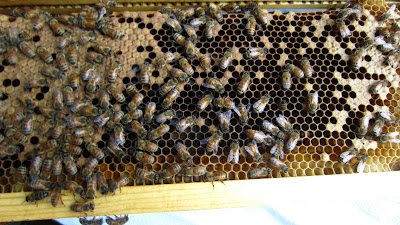I did worry about the bees, though, and checked my hives at home on Thursday. After all, if the Top Bar absconded, could the others be far behind? My goal was to see if they were eating up all their stored honey and if I might need to consider feeding them.
In every hive I found stored honey and uncapped nectar. The bees have been working the porcelain berry really hard lately and maybe it is a nectar source. I don't see them with pollen on those vines, but they are all over the flowers. The bloom is almost over, though.

I found frames like the one above in every hive. I also found boxes full of capped honey like the one below.

I even found some newly drawn wax....

By way of management, I removed one box from the hive below because it is a small hive and they were not using the space. I am most worried about this hive. They do have a queen who is laying, and they have some stored honey, but this is the weakest hive in my apiary. This was a split off of Colony Square and has not done well - they've had two queens since the split that they made from frames of brood and eggs. I should move some frames of brood and eggs into this hive to bring up the numbers, if nothing else. This hive will never make it through the winter at this rate.

Other management tasks: I put bottle caps under most of the top covers to help with ventilation in this heat. Also if the bees were not using their newest box addition, I moved it to the top of the hive so its empty space could also help with ventilation.

The little kitten swarm is living still in nuc boxes (three of them). I wondered how they were doing. I looked and easily found the queen - she's in both photos below. I was so relieved and she looks like the queen who ate the honey off of my fingertip, so I am going to believe that she is the actual queen of the hive.

If you don't see her right away, she's near the bottom of the frame just to the right of center.

So for now, I'm not worrying about the strength of my hives' stores - they all seem OK for the moment.
Although if the nectar is done for the year, I'll probably feed going into September....it's funny because my general stance is that I want survivor bees and don't want to feed them if they can't manage on their own, but with this many hives, I feel a lot of responsibility not to lose my investment in addition to not wanting to lose the bees.
Temperature record set in Atlanta today at 106.8!


















